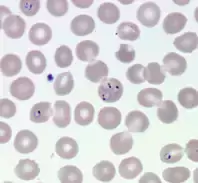The research group
Christopher Sundling has his own team focusing on inflammation and immune regulation during infection, especially malaria and tuberculosis. David Plaza leads work on malaria antigen discovery and vaccine design. Katja Wyss works on clinical aspects including diabetes and malaria in Cameroon. Victor Yman on seroepidemiology and surveillance of vector-borne infections. Klara Sondén works on improving the management of tropical fevers.
Leo Hanke's team immune engineering is interested in pathogens and the immune responses they elicit, focusing in particular on emerging and re-emerging viruses.
Several clinicians are leading their own project teams and PhD students including Judith Bruchfeld working on tuberculosis and post-covid, Lina Davies Forsman working on multidrug-resistant tuberculosis, Ann Tammelin on health care-associated infections and Helena Hervius Askling on vaccine trials.

Our research on malaria
Malaria remains a major global health problem and new tools are needed to reduce malaria morbidity and mortality and eventually reach the goals of elimination. Development of an efficacious vaccine will require further understanding of how natural immunity to malaria is acquired and maintained. Our group is particularly interested in the importance of the extensive diversity of parasite antigens and identifying antigens to be included in a multicomponent vaccine against malaria. This includes also understanding how immunity to malaria is acquired and maintained. We study in depth the immune responses to malaria in a cohort of patients successfully treated for malaria and prospectively followed in Sweden, thus without risk of reinfection. Immunological memory and systems immunology is studied in the context of malaria as well as other infections.
With the aim to improve the clinical management and prevention of malaria, we have established a nationwide study and study the acute and long term effects of malaria. We are also interested the impact of apparently asymptomatic infections and the prevalence and health consequences of malaria and other parasites in migrants and the need to introduce screening.
Ongoing research
Acquisition and maintenance of immunity to malaria:
Molecular epidemiology of malaria: Understanding how natural immunity to malaria develops in populations living in endemic areas can guide the development of vaccines and other malaria interventions. Molecular and immunological tools are used to investigate the epidemiology of malaria in populations with different degrees of exposure. The genetic diversity of parasite antigens is studied in relation to disease and immune responses, in closely followed population cohorts in areas of different transmission. We have previously shown that individuals in endemic areas that are persistently infected with multiple parasite clones are at reduced risk of clinical malaria and also have broader antibody responses. Current projects investigate the importance of repeated and chronic infections to the maintenance of otherwise short lived antibody responses, as well as the importance of the extensive genetic diversity of parasite antigens for the acquisition clinical protection against malaria.
Clinical epidemiology and management of malaria:
The outcome of a malaria infection is largely affected by the acute clinical management. In addition to the morbidity and mortality due to acute disease, malaria might also have longterm consequences on health. As part of a nationwide study in Sweden, we assess factors affecting severe malaria including maintenance of immunity and comorbidities such as diabetes and obesity. By using national health registers and individual medical record data we study acute and longterm effect of malaria in relation to host factors. In addition, we study the epidemiology of malaria in in a longitudinally followed population in Tanzania. These projects focus on clinical aspects of malaria, including prognostic factors, diagnostics and therapy, with the overall aim to improve the management and prevention of malaria.
Malaria and vaccine immunology:
Mechanistic insights into the control of long-lived humoral immunity: Vaccines work by stimulating the immune system with components of pathogens without experiencing a fullblown infection. However, although the protective effect of most licensensed vaccines is very high, the durability of the protection varies widely between vaccines. The tick-borne encephalitis virus (TBEV) vaccine, e.g. needs to be boosted every three to five years while the measles vaccine generally generates protective immunity for the life-time of the individual. Live vaccines, such as the measles vaccine, generally induce immunity that lasts longer compared to inactivated- or subunit vaccines, such as the TBEV or tetanus vaccines, as they more closely mimick the natural infection. However, not all natural infections lead to long-lasting immunity. Individuals that were previously immune to malaria disease can become susceptible again after staying in non-endemic regions for a few years, indicating that malaria-specific immunity is very short-lived.
It is currently unclear why there is such a difference in the longevity of immunity and this is an important problem to solve, so that current and future vaccines can be improved and generate longer lasting immunity. To increase our understanding of the mechanisms that govern longevity of an immune response we use molecular approaches to investigate antigen-specific immune cells at different time-points after vaccination or infection that induce long- or short-lived immunity. This approach enable us to better understand how the immune cells are programmed in the context of long- vs short-lived immunity, and thereby help guide future vaccine efforts.
Changes to the immune landscape after malaria infection: Malaria infection is associated with a strong activation of the innate immune response. This activation is characterized by high levels of interferon gamma, which is characteristic of a Th1 immune response. The innate signal type and strength is important inshaping the size and direction of the adaptive immune response. In recent years, it has become clear that the strong Th1 signal observed during malaria infection may have implications for the longevity and reactivation of the adaptive immune response. Current projects investigate the immune landscape in individuals that experience malaria for the first time, or that have experienced malaria previously. Using mass cytometry, we have found that the innate and adaptive immune profiles differ in the monocyte, T cell, NK cell, and B cell compartments between the groups, findings that are currently being investigated further.
